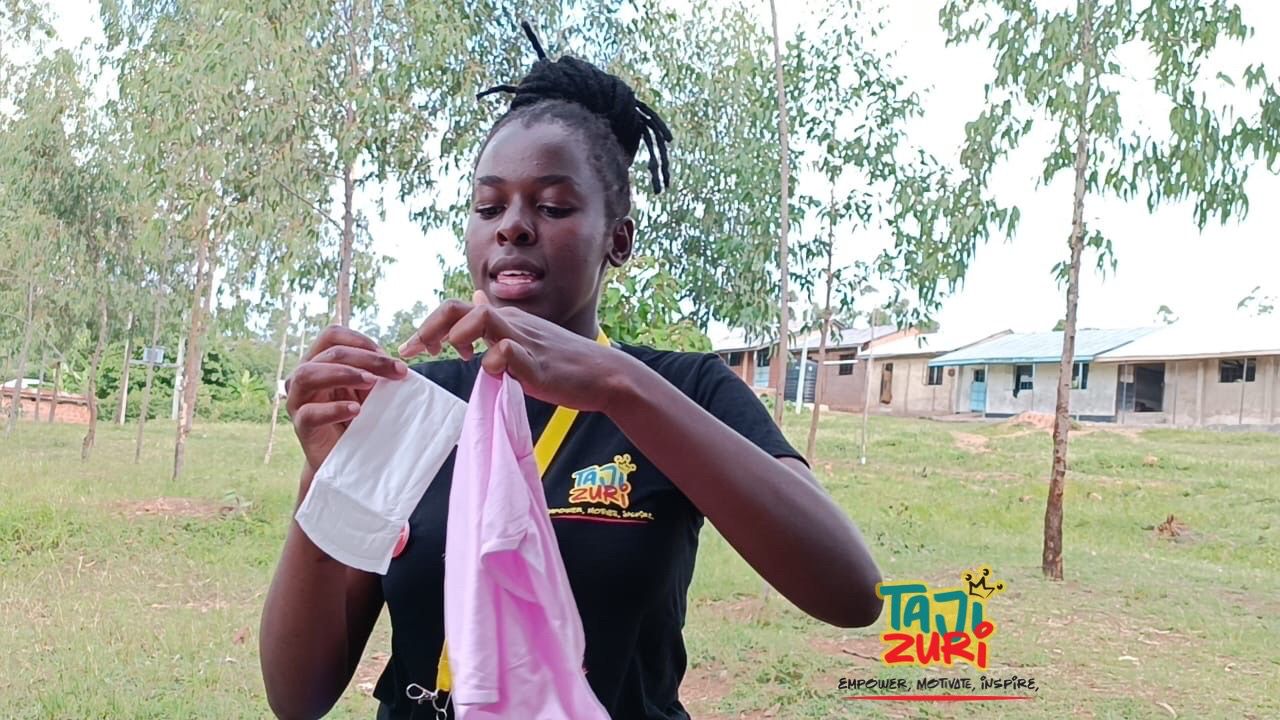Background
Menstrual Hygiene Management (MHM) is a critical yet often overlooked aspect of public health that significantly influences girls’ education worldwide. Inadequate MHM resources and facilities can lead to increased absenteeism, reduced academic performance, and higher dropout rates among school-aged girls. This article examines the impact of MHM on girls’ school attendance from Global, Regional, National (Kenya), and County (Homabay) perspectives. Additionally, it highlights the commendable efforts of TajiZuri, a non-profit organization, in promoting menstrual hygiene.
Introduction
Globally, millions of girls face challenges in managing menstruation due to a lack of access to sanitary products, inadequate sanitation facilities, and prevailing cultural stigmas. These challenges contribute to school absenteeism, with girls missing up to five days of school each month, amounting to 60 days annually. This absenteeism adversely affects their academic performance and future opportunities.
In low- and middle-income countries, the situation is particularly concerning. For instance, in Bangladesh, a study revealed that menstruation-related absenteeism decreased from 25% in 2014 to 14% in 2018, following improvements in MHM facilities and education. This underscores the positive impact of targeted interventions on reducing absenteeism.
In Kenya, menstrual health challenges significantly affect girls’ education. According to the World Bank, 95% of menstruating girls miss one to three days of school per month, with 70% reporting a decline in grades as a result. Over 50% fall behind in school due to menstruation-related issues. The Kenyan government has introduced policies to mitigate these challenges, including tax exemptions on sanitary towels and commitments to provide safe disposal mechanisms in schools. Non-governmental organizations have also played a pivotal role in supplying sanitary products and educating the public on menstrual health.
At the County level, regions like Homabay have witnessed concerted efforts to improve MHM. Local initiatives focus on providing sanitary products, enhancing sanitation facilities in schools, and conducting educational programs to demystify menstruation. These efforts aim to reduce absenteeism and empower girls to pursue their education without interruption.
The Impact of Menstrual Hygiene on Girls’ School Attendance and Well-being
Menstrual hygiene plays a crucial role in ensuring that girls attend school consistently, maintain their confidence, and safeguard their overall well-being. In many communities, inadequate access to Menstrual Hygiene products and facilities has been a significant barrier to girls’ education. However, with improved awareness, access to sanitary products, and the implementation of menstrual-friendly policies in schools, the impact has been transformative thus:
Increasing School Attendance
Before the introduction of Menstrual Hygiene education and better access to sanitary products, many girls missed school during their periods due to embarrassment, fear of leakage, and lack of proper facilities. Studies indicate that in some regions, girls could miss up to 5 days of school per month, leading to poor academic performance and a higher dropout rate. However, with improved Menstrual Hygiene Management (MHM), schools have seen a significant reduction in absenteeism, allowing girls to remain engaged in their education.
Boosting Confidence and Mental Well-being
Menstruation has long been stigmatized, leading many girls to feel ashamed and anxious during their periods. The availability of sanitary products, private washrooms, and proper education about menstruation has empowered girls to manage their periods with dignity. This boosts their self-confidence, helping them participate actively in class and extra-curricular activities without fear of discrimination or discomfort.
Additionally, reducing the anxiety associated with menstruation positively impacts their mental well-being. When girls feel supported, they experience less stress and anxiety, leading to better concentration in school and overall improved academic performance.
Enhancing Better Hygiene and Health
Access to Menstrual Hygiene products and clean sanitation facilities has also improved girls’ overall health. Without proper hygiene, girls face risks of infections and other health complications. Schools that provide safe and clean toilets, water, and disposal facilities ensure that girls can manage their periods hygienically, leading to better reproductive health and well-being.
TajiZuri’s Initiatives in Promoting Menstrual Hygiene
TajiZuri, a non-profit organization, has been instrumental in advancing Menstrual Hygiene in Kenya. Their comprehensive approach includes distributing reusable sanitary pads, conducting workshops to educate both boys and girls on Menstrual Health, and advocating for policy changes to support MHM. By collaborating with schools and communities, TajiZuri has significantly reduced menstruation-related absenteeism and fostered a supportive environment for girls.
CONCLUSION
Effective menstrual hygiene management is crucial for ensuring that girls can attend school consistently and perform to their full potential. Addressing MHM challenges requires a multifaceted approach, involving policy interventions, community engagement, and the dedicated efforts of organizations like TajiZuri. By prioritizing Menstrual Hygiene, we can create an equitable educational environment where all students have the opportunity to succeed.
Article written by:
Abongo Emily
Programs Co-ordinator




